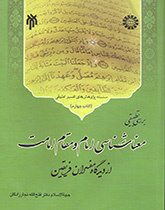This book is the fourth in a series of comparative interpretation studies including five chapters. The first chapter is generalities, which includes the topics of “contemplation on the doctrine of Imamate in the view of Fariqeyn”, "Study of the commentators' views on the semantic aspects of the Imam in the Qur'an and the refinement of the subject" and "A brief overview of the research background". The second to fifth chapters are devoted to a comparative study of "Imamate and test with words", "status of Imamate", "terminology of Imam" and "infallibility (Ismat) and knowledge of Imam", respectively. Each of these chapters, after presenting the introductory topics, examines the views of Shiites and Sunnis and then evaluates their views, and with the focus on the verse of the Imamate of Prophet Ibrahim (Baqarah, 124), it has been concluded that when testing forassigning Imamate status after the prophethood of Ibrahim and consequently, granting the position of Imamate will be superior to the position of prophethood. Imamate means "leadership with the obligation to follow and obey independently" - which is consistent with the theory of "religion assignment" - this theory is based on the conceptual analysis of Imamate based on Qur'anic and narrative proofs. Because "covenant" (A’hd) (in the mentioned verse) has a special meaning of Imamate - and not any kind of religious embassy - and the oppressor is against the infallible - and not against the just - the Imam must be infallible and logically have special knowledge.
Author(s) :
Fathollah Najjarzadegan, PhD


